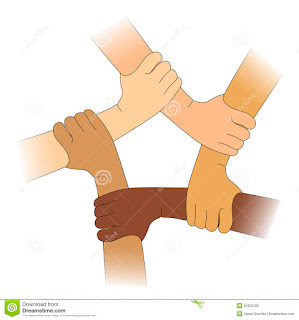Lena McKnight 10/3/2016 Revised: What is Racial Identity?
By: Sarah Leen
Race
has been used for years to place people into different social constructs in
society. Scientist studied the idea of race, to attempt to show how a
particular group of people can achieve more than another set of people based on
elements that are influenced by racial identity. Census has shown that people are
identifying themselves beyond the four categories originally set in place by
scientist. When one considers race from a sociological standpoint we can see
evidence that shows that the original concept of race is wrong. It is
impossible to classify all people into four simple categories because DNA shows
us that it’s much more complex than what meets the eye. For example people may
identify themselves to be African American however they could possess the same
mitochondrial DNA as a person who identifies themselves as Asian.
Ossorio
shows how complex race is as he offers suggestions that scientist are wrong to
use it to determine personal external and internal differences. The idea of
race according to Ossoriso came from scientist who believed that you can define
race into four classifications, but according to the relationship of what race
means to a person can change on an individual base. The film “Race: The Power
of Illusion, Episode 1”, Pillar Ossorio, students were asked to give a sample
of their DNA, to test with other with other students to see which modern
genetics match. . Students believed the fallacies that they would have more
similarity with the same person from the racial back ground based on physical
features. The study showed that many of their mitochondrial DNA was similar to
students who were different racial categories thus proving that physical
features alone cannot determine a persons racial identity.
The
idea of a person identifying themselves according to one of the four races
classifications that scientist thought a person could identify with has
changed. Grieco, showed how individuals labels themselves as more than one
classification according to the census. Grieco gave an example from the census
2000 on how the categories were split giving more people options to choose
their racial background. From the 1990 census they showed that standard outline
in the OMB has changed for the 2000 census. The categories has changed by
splitting Asian and Pacific Islander thus creating five categories and giving
people the option of choosing more than one racial identification. This alone
shows that a person identification may change over time.
My
mother’s parents are southern German, Blackfoot Indian, and Creole from
Louisiana and my father’s parents are of African descent from the South
Carolina. Which is why, I don’t identify with one racial category. Many people
often think my mom is Hispanic because her physical features. Up until June, my
father was often mistaken for West Indian when he had dread locks. Which lets
me know people assume they can tell a person racial background from the way
they look. I try to visit my family in Virginia as often as possible; this
helps me stay connected to my roots and to understand my family background.
References
Glasgow, M. J.
(2003). On The New Biology of Race. Journal of Philosophy, Inc., 456-474.
Grieco, M. E.
(2002). An Evaluation of Bridging Methods Using Race Data from Census
2000. Springer in cooperation with the Southern Demographic
Association, 91-107.
Online
Link


No comments:
Post a Comment